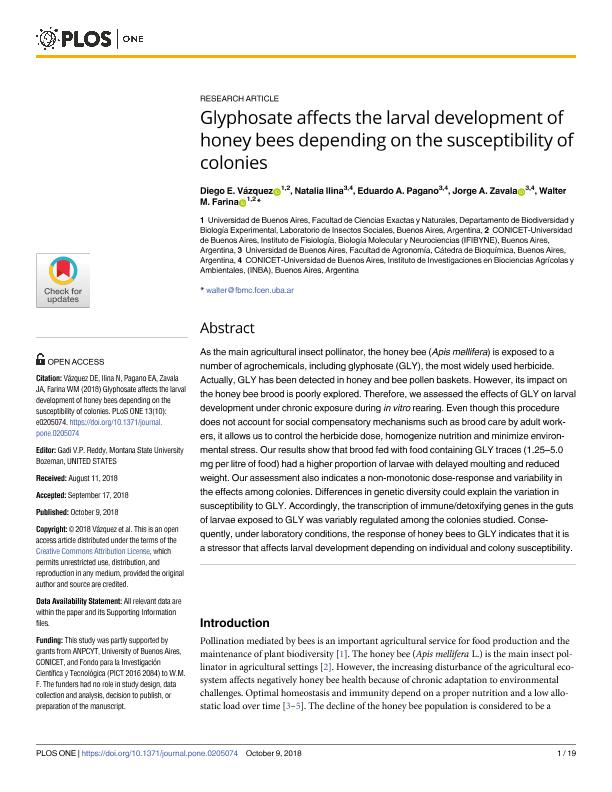Artículo
Glyphosate affects the larval development of honey bees depending on the susceptibility of colonies
Vázquez, Diego Eduardo ; Ilina, Natalia
; Ilina, Natalia ; Pagano, Eduardo Antonio; Zavala, Jorge Alberto
; Pagano, Eduardo Antonio; Zavala, Jorge Alberto ; Farina, Walter Marcelo
; Farina, Walter Marcelo
 ; Ilina, Natalia
; Ilina, Natalia ; Pagano, Eduardo Antonio; Zavala, Jorge Alberto
; Pagano, Eduardo Antonio; Zavala, Jorge Alberto ; Farina, Walter Marcelo
; Farina, Walter Marcelo
Fecha de publicación:
10/2018
Editorial:
Public Library of Science
Revista:
Plos One
ISSN:
1932-6203
Idioma:
Inglés
Tipo de recurso:
Artículo publicado
Clasificación temática:
Resumen
As the main agricultural insect pollinator, the honey bee (Apis mellifera) is exposed to a number of agrochemicals, including glyphosate (GLY), the most widely used herbicide. Actually, GLY has been detected in honey and bee pollen baskets. However, its impact on the honey bee brood is poorly explored. Therefore, we assessed the effects of GLY on larval development under chronic exposure during in vitro rearing. Even though this procedure does not account for social compensatory mechanisms such as brood care by adult workers, it allows us to control the herbicide dose, homogenize nutrition and minimize environmental stress. Our results show that brood fed with food containing GLY traces (1.25-5.0 mg per litre of food) had a higher proportion of larvae with delayed moulting and reduced weight. Our assessment also indicates a non-monotonic dose-response and variability in the effects among colonies. Differences in genetic diversity could explain the variation in susceptibility to GLY. Accordingly, the transcription of immune/detoxifying genes in the guts of larvae exposed to GLY was variably regulated among the colonies studied. Consequently, under laboratory conditions, the response of honey bees to GLY indicates that it is a stressor that affects larval development depending on individual and colony susceptibility.
Palabras clave:
GLYPHOSATE
,
APIS MELLIFERA
,
LARVAL DEVELOPMENT
,
SUSCEPTIBILITY
Archivos asociados
Licencia
Identificadores
Colecciones
Articulos(IFIBYNE)
Articulos de INST.DE FISIOL., BIOL.MOLECULAR Y NEUROCIENCIAS
Articulos de INST.DE FISIOL., BIOL.MOLECULAR Y NEUROCIENCIAS
Articulos(INBA)
Articulos de INST.DE INVEST. EN BIOCIENCIAS AGRICOLAS Y AMBIENTALES
Articulos de INST.DE INVEST. EN BIOCIENCIAS AGRICOLAS Y AMBIENTALES
Citación
Vázquez, Diego Eduardo; Ilina, Natalia; Pagano, Eduardo Antonio; Zavala, Jorge Alberto; Farina, Walter Marcelo; Glyphosate affects the larval development of honey bees depending on the susceptibility of colonies; Public Library of Science; Plos One; 13; 10; 10-2018; 1-19
Compartir
Altmétricas



